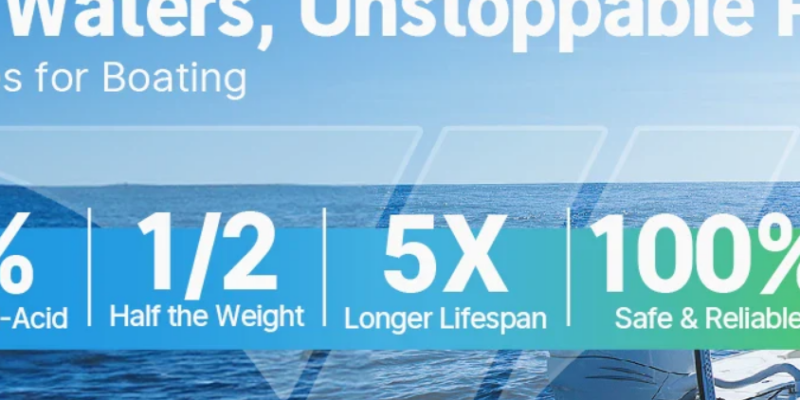As boating technology advances, so too does the need for better, more efficient power sources. Lithium marine batteries have emerged as a groundbreaking solution, offering numerous advantages over traditional lead-acid batteries. These batteries are transforming the boating experience, providing boat owners with lighter, longer-lasting, and more sustainable power options. In this article, we will explore the benefits, key features, and considerations when choosing lithium batteries for your boat.
Table of Contents
ToggleWhat is a Lithium Marine Battery?
A lithium marine battery is a type of rechargeable battery that uses lithium-ion or lithium iron phosphate (LiFePO4) technology to store and deliver electrical energy. These batteries are designed specifically for use in marine environments, where reliability, efficiency, and durability are crucial. Unlike traditional lead-acid batteries, lithium marine batteries are lighter, more compact, and capable of delivering consistent power over longer periods.
Key Benefits of Lithium Marine Batteries
-
Longer Lifespan Lithium batteries have a significantly longer lifespan compared to their lead-acid counterparts. A well-maintained lithium marine battery can last up to 10 years or more, whereas lead-acid batteries typically need replacing after 3-5 years. This longevity not only reduces replacement costs but also provides more reliable performance over time.
-
Lighter Weight One of the most notable advantages of lithium marine batteries is their reduced weight. Lithium batteries are typically 50% lighter than lead-acid batteries of the same capacity. This weight reduction is particularly important for boats, as it improves overall performance, fuel efficiency, and handling. The lighter weight also allows for more flexibility in terms of battery placement and storage space on the boat.
-
Faster Charging Lithium marine batteries charge much faster than lead-acid batteries. While a traditional battery might take several hours to charge fully, a lithium battery can reach 80% charge in just 1-2 hours, depending on the charging system. This quick recharge time is particularly beneficial for boaters who need to maximize their time on the water without long waits for battery recharge.
-
Higher Energy Density Lithium batteries store more energy in a smaller, lighter package compared to lead-acid batteries. This higher energy density means that you can store more power in less space, reducing the need for large battery banks. This is especially beneficial for boats that require more power for multiple electrical systems, such as motors, lights, and onboard electronics.
-
Consistent Power Output Lithium batteries provide a consistent voltage throughout their discharge cycle. This means that your boat’s systems will receive stable power, even as the battery drains. In contrast, lead-acid batteries experience a voltage drop as they discharge, which can lead to poor performance, especially for demanding electrical equipment like trolling motors and navigation systems.
-
Eco-Friendly Lithium marine batteries are more environmentally friendly than traditional lead-acid batteries. They are free of toxic materials like lead and acid, which can leach into the environment if not disposed of properly. Additionally, lithium batteries have a higher energy efficiency, meaning less energy is wasted during charging and discharging cycles. This results in lower carbon emissions and a greener boating experience.
Considerations When Choosing a Lithium Marine Battery
-
Cost The initial cost of a lithium marine battery is higher than that of a lead-acid battery. However, this upfront investment is often outweighed by the battery’s longer lifespan and lower maintenance costs. Over the course of several years, a lithium battery can save boat owners money on replacements and repairs.
-
Battery Management System (BMS) Most lithium marine batteries are equipped with a Battery Management System (BMS) to ensure safe operation. The BMS helps to monitor the battery’s voltage, temperature, and state of charge, preventing issues like overcharging, deep discharging, and overheating. When selecting a lithium battery, it’s important to choose one with a high-quality BMS for optimal performance and safety.
-
Temperature Sensitivity Lithium batteries perform best in moderate temperatures. Extreme heat or cold can affect their efficiency and longevity. However, many modern lithium marine batteries are designed to operate in a wide range of temperatures and come with built-in thermal protection. Still, boat owners should consider the temperature conditions of their environment when selecting a battery.
-
Compatibility with Charging Systems When upgrading to a lithium marine battery, it’s essential to ensure that the boat’s charging system is compatible. While many modern charging systems are lithium-compatible, older systems may require an upgrade to work efficiently with lithium batteries. Always check the specifications and consult with a marine technician if you’re unsure.
Conclusion
Lithium marine batteries represent a significant leap forward in boating technology. Their lightweight design, long lifespan, faster charging, and consistent power output make them an excellent choice for boat owners looking to enhance their vessel’s performance. Although the initial cost may be higher, the long-term benefits far outweigh the investment. By upgrading to a lithium marine battery, you’re not just improving your boat’s electrical efficiency—you’re also contributing to a greener, more sustainable future for boating.
Whether you’re a casual boater or a dedicated marine enthusiast, lithium marine batteries provide the reliability, performance, and eco-friendliness that can transform your boating experience. With the right battery and maintenance, you’ll be able to enjoy longer trips, more power, and fewer worries on the water.
